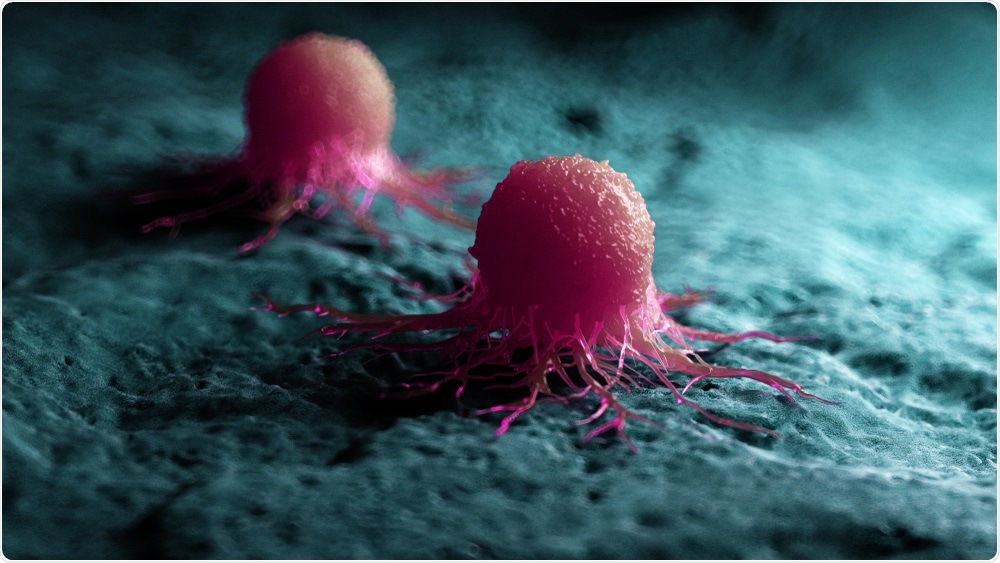If there is a positive aspect in cancer’s random biology, it is that the same characteristics that promote the growth of cancer cells usually present opportunities for destroying them.

Image Credit: SciePro/Shutterstock.com
That is the main concept behind a recent research article penned by Xuejun Jiang, a cell biologist from the Sloan Kettering Institute, and Craig Thompson, CEO, and President of Memorial Sloan Kettering. The study was published in the Proceedings of the National Academy of Sciences (PNAS) on November 23rd, 2020.
The researchers observed that cancer cells usually show metabolic changes that render them susceptible to a certain kind of cell death, known as ferroptosis.
Ferroptosis, which literally means death by iron, is typically activated by oxidative stress—the accumulation of free radicals and other corrosive chemicals in cells. These are byproducts of utilizing oxygen to burn fuel for energy. However, a majority of the tumor cells, which require excessive amounts of energy to develop and divide, have identified a method to overcome this issue.
Genetic mutations that allow cancer cells to cope with oxidative stress make them more resistant to ferroptosis. Another way to say this is that without the benefit of those mutations, cancer cells might be very, very sensitive to ferroptosis.”
Dr Xuejun Jiang, Cell Biologist, Sloan Kettering Institute
Dr. Jiang and his collaborators, including Junmei Yi and Jiajun Zhu who are both postdoctoral fellows, tested this concept by administrating a combination of drugs to mice—one drug that supports ferroptosis, and one that inhibits the impact of the mutations. The outcomes of this one-two punch were significant.
A commonly mutated pathway
The specific mutations that were examined by Dr. Jiang and collaborators influence a signal-sending pathway, known as PI3K-AKT-mTOR. This pathway regulates metabolism. Mutations in the PI3K-AKT-mTOR pathway are one of the most common found in cancer. That probably mirrors the fact that tumor cells have raised the metabolic demands because of how rapidly they reproduce. Within the PI3K-AKT-mTOR pathway, cancers with mutations are some of the hardest to treat.
The researchers found that cancer cells that have these mutations showed excellent resistance to an experimental ferroptosis-triggering drug that was injected into cells growing in a dish. However, when the team added drugs that inhibit the action of this specific metabolic pathway to the ferroptosis-triggering drug, the tumor cells died.
They subsequently tested whether the same kind of effect would be observed in mouse models of prostate and breast cancers comprising these mutations. The combination of drugs indeed led to a near-complete destruction of tumors in the mice.
These were some of the most significant tumor regressions I’ve ever seen coming from experiments in my lab.”
Dr Xuejun Jiang, Cell Biologist, Sloan Kettering Institute
Dr Jiang and his colleagues also demonstrated that the mutated PI3K-AKT-mTOR pathway protects the tumor cells by boosting the activity of a protein that plays a key role in making lipids for the outer membrane of the cell.
Those additional lipids help protect the tumor cells from oxidative stress, and thus ferroptosis. Inhibiting the PI3K-AKT-mTOR pathway not only prevents the synthesis of lipids but also re-sensitizes the tumor cells to ferroptosis.
The latest findings complement the earlier study from Jiang’s laboratory, published back in 2019 in the Nature journal. In that article, Dr. Jiang observed that certain cancers exhibit mutations that make them more vulnerable to ferroptosis, even when metabolism-altering medications are not administered. In one way, the latest results indicate the other side of the equation.
The key point is that many cancers have genetic alterations that can be exploited to trigger ferroptosis and kill the cells. It’s an exciting way to think about developing new cancer treatments.”
Dr Xuejun Jiang, Cell Biologist, Sloan Kettering Institute
The researchers have currently applied for a patent associated with this study. They are now planning to test the combination of drugs in tumor samples acquired from patients being treated at Memorial Sloan Kettering Cancer Center.
Source:
Journal reference:
Yi, J., et al. (2020) Oncogenic activation of PI3K-AKT-mTOR signaling suppresses ferroptosis via SREBP-mediated lipogenesis. PNAS. doi.org/10.1073/pnas.2017152117.